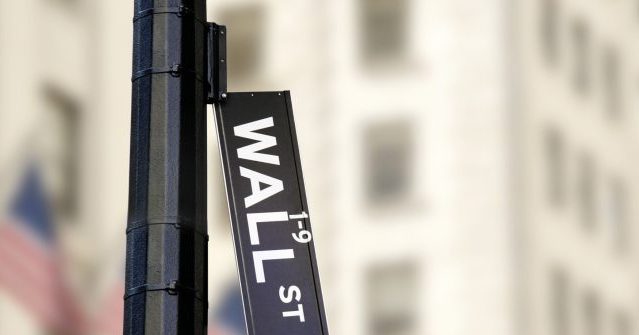Breitbart Business Digest: Establishment Media Cries Foul as GOP Stands Up to Wall Street Money

Republicans Caught Resisting Donor Influence The nation’s capital is being rocked by revelations that Republican lawmakers may be undermining the very foundations of our democracy by refusing to do the bidding of their donors. One of the brightest political developments over the past two years has been the growing willingness among Republicans to take principled stands against woke corporatism and the pernicious influence of the environmental, social, and governance (ESG) movement in investing. Republican leaders from West Virginia Treasurer Riley Moore, to Florida Governor Ron DeSantis, to newly announced candidate for the GOP presidential nomination Vivek Ramaswamy have been boldly standing up to left-wing corporatism. Vivek Ramaswamy delivers remarks at the 2022 AmericaFest in Phoenix, Arizona, on December 19, 2022. (Gage Skidmore/Flickr) If you thought the establishment media would cheer on Republican resistance to corporate interest, think again. On Tuesday, an article on CNBC’s website vilified Republicans for taking money from the likes of BlackRock and Vanguard even while speaking out against them.
The New York Times’ Dealbook reported that Republican stances against ESG and woke corporate influence “is growing increasingly complicated — especially given new revelations that lawmakers who have publicly berated companies for pursuing E.S.G. strategies have also taken big donations from those same businesses.” In other words, Republican lawmakers stand accused of taking tens of thousands of dollars from financial companies that have promoted ESG investing and then refusing to allow that money to influence their views on public policy. In fact, many of the Republicans in the House have publicly admitted that they will not allow political donations to affect their views on issues such as ESG. Rep. Bill Huizenga (R-MI), who chairs the House Financial Services Oversight and Investigations Subcommittee and leads the ESG working group, received thousands of dollars in donations from the likes of Vanguard, State Street, and Goldman Sachs. His spokesman told CNBC that the donations would not change his positions. “Congressman Huizenga will continue to stand on his stated policy positions and legislation regarding the topic of ESG,” he said. Rep. Bill Huizenga (R-MI) speaks on the floor of the House of Representatives on April 23, 2020. (House Television via AP) You can imagine the shudders of horror that must have washed through the newsrooms of CNBC and the New York Times when it was discovered that Republican politicians are acting in ways that suggest they are not enthralled to political donations from financial companies and other big corporations. If you cannot trust political donations to fix politics, how can you trust anything at all? The U.S. economy grew at a slightly slower pace in the fourth quarter of last year and prices rose at a faster clip, the second estimate of gross domestic product from the Bureau of Economic Analysis (BEA) showed on Thursday. This might be the worst combination of revisions imaginable because it illuminates the possibility that growth might have to slow down a lot more than thought to bring inflation under control.
The downward revision in overall growth was not completely unexpected. Although the consensus had growth as unchanged and some of Wall Street’s more bullish analysts were calling for an upward revision, the revision from an annual real growth rate of 2.9 percent to 2.7 percent was within the range of forecasts. It means that growth was still above trend at the end of the year and nowhere near anything that could be considered a recession. Consumer spending was revised down by quite a lot.
The preliminary estimate was for growth of 2.1 percent. Now the BEA estimates growth was just 1.4 percent. Spending on goods plunged 0.5 percent instead of rising 1.1 percent as initially reported. Durable goods spending contracted by 1.8 percent, which means the revision took 2.3 percentage points off the first estimate of 0.5 percent growth. Nondurable goods spending went from an estimated growth of 1.5 percent to just 0.2 percent. On of the best measures of the economy within the BEA’s GDP release tracks “final sales to private domestic purchasers.” This had been reported as growing at an already sluggish 0.2 percent.
The revision knocked it down to 0.1 percent, an indication that private sector growth nearly ground to a halt. Given the pace of the retreat in consumer expenditures on goods and the drop in final sales, the upward revision in inflation is startling.
The increase in the fourth quarter personal consumption price index was revised upward from 3.2 percent to 3.7 percent.
The core PCE price index gain was revised up from 3.9 percent to 4.3 percent. So even a lower level of consumer spending was not enough to tame prices. This implies that it may take a more severe slowdown to bring inflation back down toward the Federal Reserve’s two percent target.
Read the full article at the original website
References:
- https://www.breitbart.com/tag/riley-moore/
- https://www.breitbart.com/tag/vivek-ramaswamy/
- https://www.cnbc.com/2023/02/21/gop-lawmakers-esg-blackrock-vanguard.html
- https://www.nytimes.com/2023/02/22/business/dealbook/republicans-esg-vivek-ramaswamy.html
- https://www.breitbart.com/terms-of-use/
- https://www.breitbart.com/privacy-policy/
- https://www.breitbart.com/economy/2023/02/23/gdp-revised-lower/
